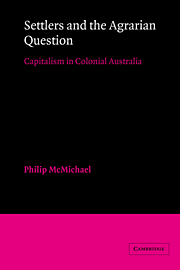Book contents
- Frontmatter
- Contents
- List of tables
- Preface
- 1 The social structure of British hegemony
- PART I THE COLONIAL ECONOMY ENTERS THE WORLD MARKET (1788–1830)
- 2 The transition from penal to commercial colony
- 3 The world-economic origins of colonial wool growing
- PART II THE SQUATTING PHASE OF PASTORALISM (1830s AND 1840s)
- PART III CONFRONTING THE AGRARIAN QUESTION (1840–1900)
- APPENDIXES
- References
- Index
2 - The transition from penal to commercial colony
Published online by Cambridge University Press: 18 December 2009
- Frontmatter
- Contents
- List of tables
- Preface
- 1 The social structure of British hegemony
- PART I THE COLONIAL ECONOMY ENTERS THE WORLD MARKET (1788–1830)
- 2 The transition from penal to commercial colony
- 3 The world-economic origins of colonial wool growing
- PART II THE SQUATTING PHASE OF PASTORALISM (1830s AND 1840s)
- PART III CONFRONTING THE AGRARIAN QUESTION (1840–1900)
- APPENDIXES
- References
- Index
Summary
INTRODUCTION
The British settlement of Australia in 1788 was notably a public undertaking. Unlike former privately conducted systems of convict transportation to the North American settler colonies, the expatriation of convicts to Australia under military command was a novel venture of the British Crown. There is controversy among historians concerning the transition from penal to commercial status of the settlements because the initial settlements in New South Wales and Van Dieman's Land were penal colonies. Interpretations differ regarding the origins, nature, and timing of this transformation. Such controversy is misdirected, however, because of its limited focus. It fails to take into account the historical origins of the colony as the projection of a metropolitan society undergoing commercial transformation. It therefore fails to recognize the immanence of capitalist social relations within the original colonial military bureaucratic state.
In fact, there are very few systematic analyses of the dynamics of settler societies in terms of their origins and transformation as frontiers of European expansion. The contributions that have been made can be divided into either cultural-ideological studies or staple theories of economic growth. These theories fail to explore the connections between social relations in settler societies and the world market.
The cultural-ideological perspective derives from classical theories of social evolution developed by such writers as Weber, Durkheim, and Toennies. This perspective regards colonial settlers as embodying culturally ascendant behavioral and psychological qualities – practices and beliefs in the vanguard of social transition in Europe. The qualities the classical sociologists represented as “modern” – individualism and rationality, qualities of the market society – comprised the social psychology of the settlers.
- Type
- Chapter
- Information
- Settlers and the Agrarian QuestionCapitalism in Colonial Australia, pp. 35 - 53Publisher: Cambridge University PressPrint publication year: 1984



